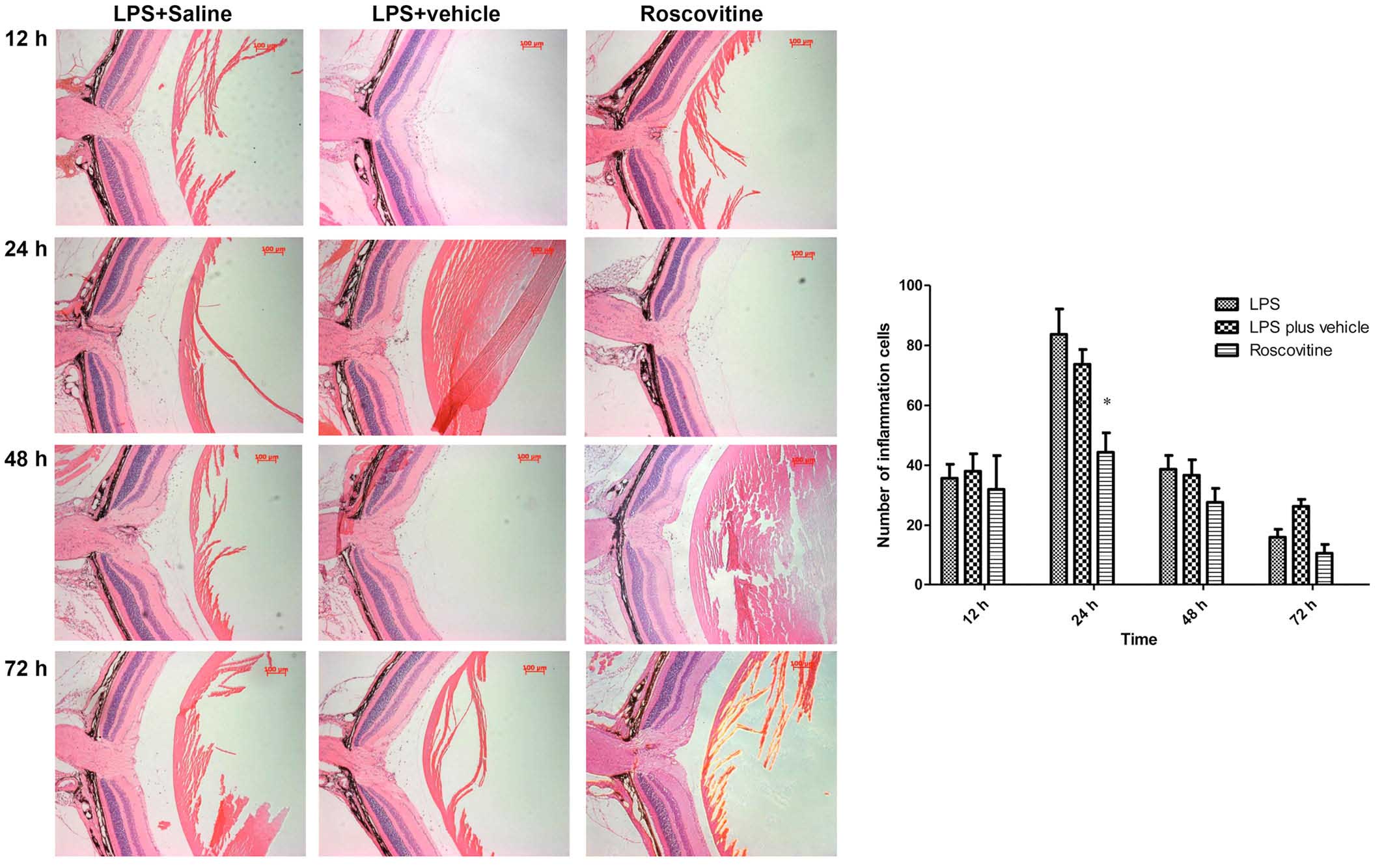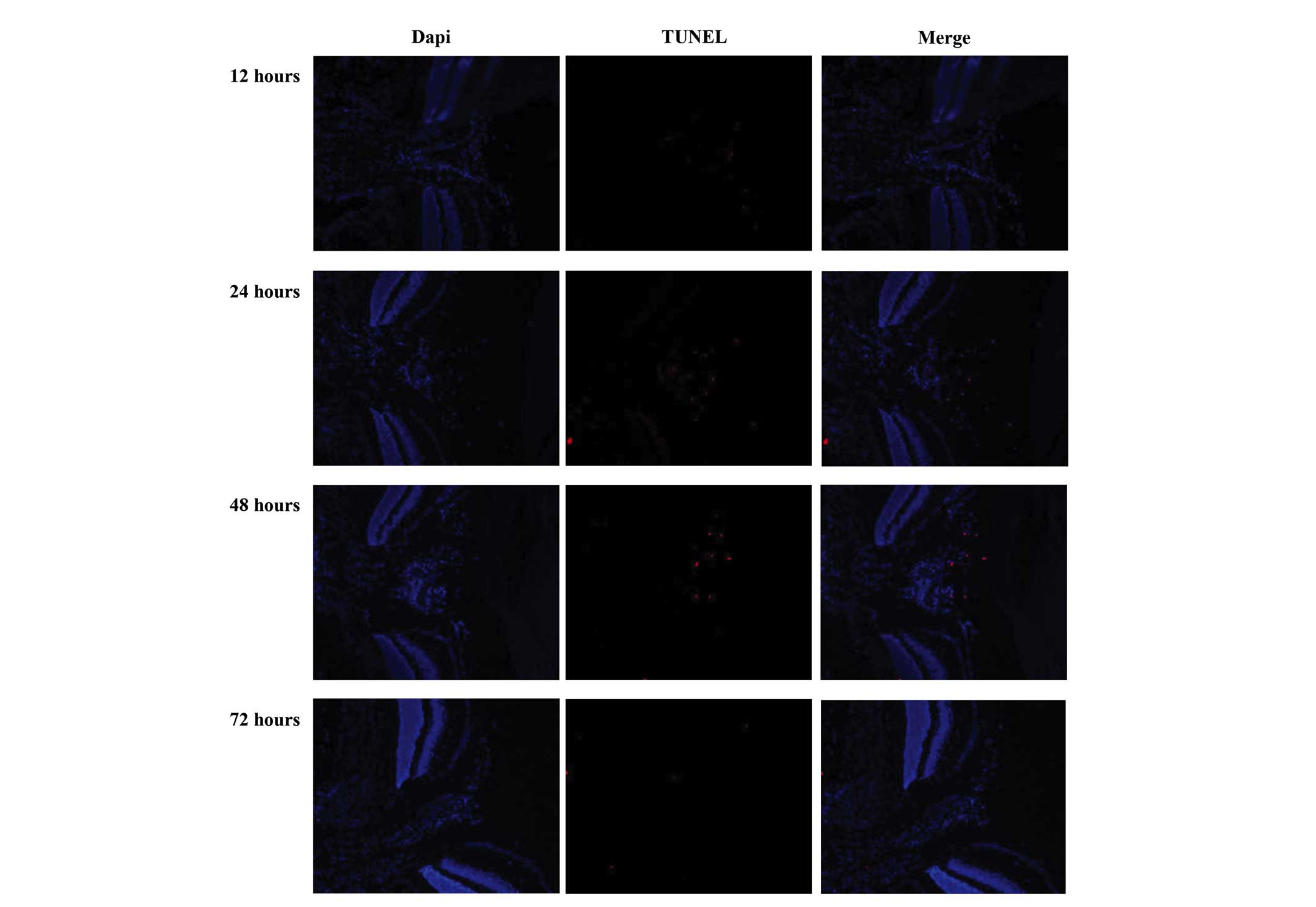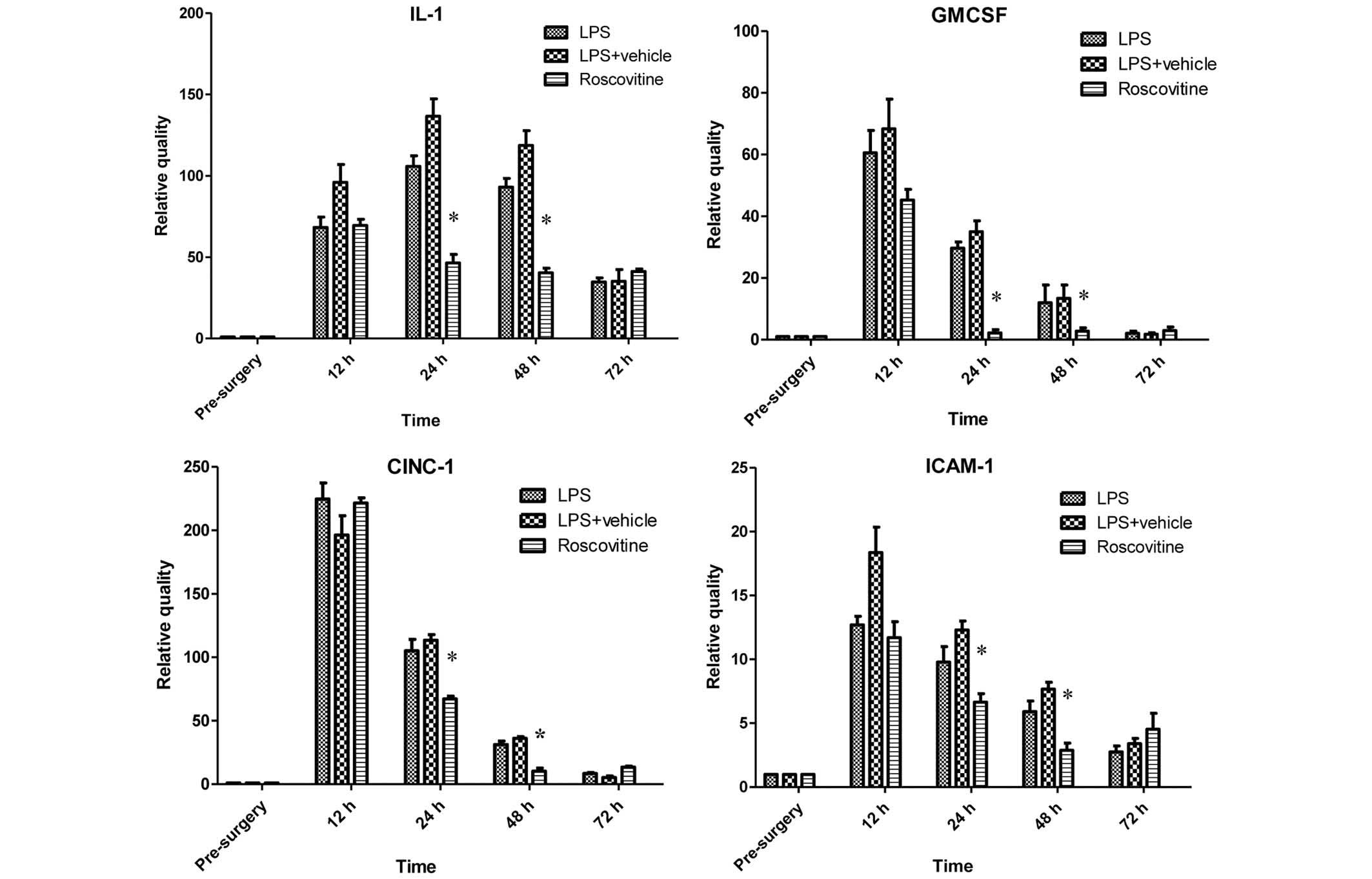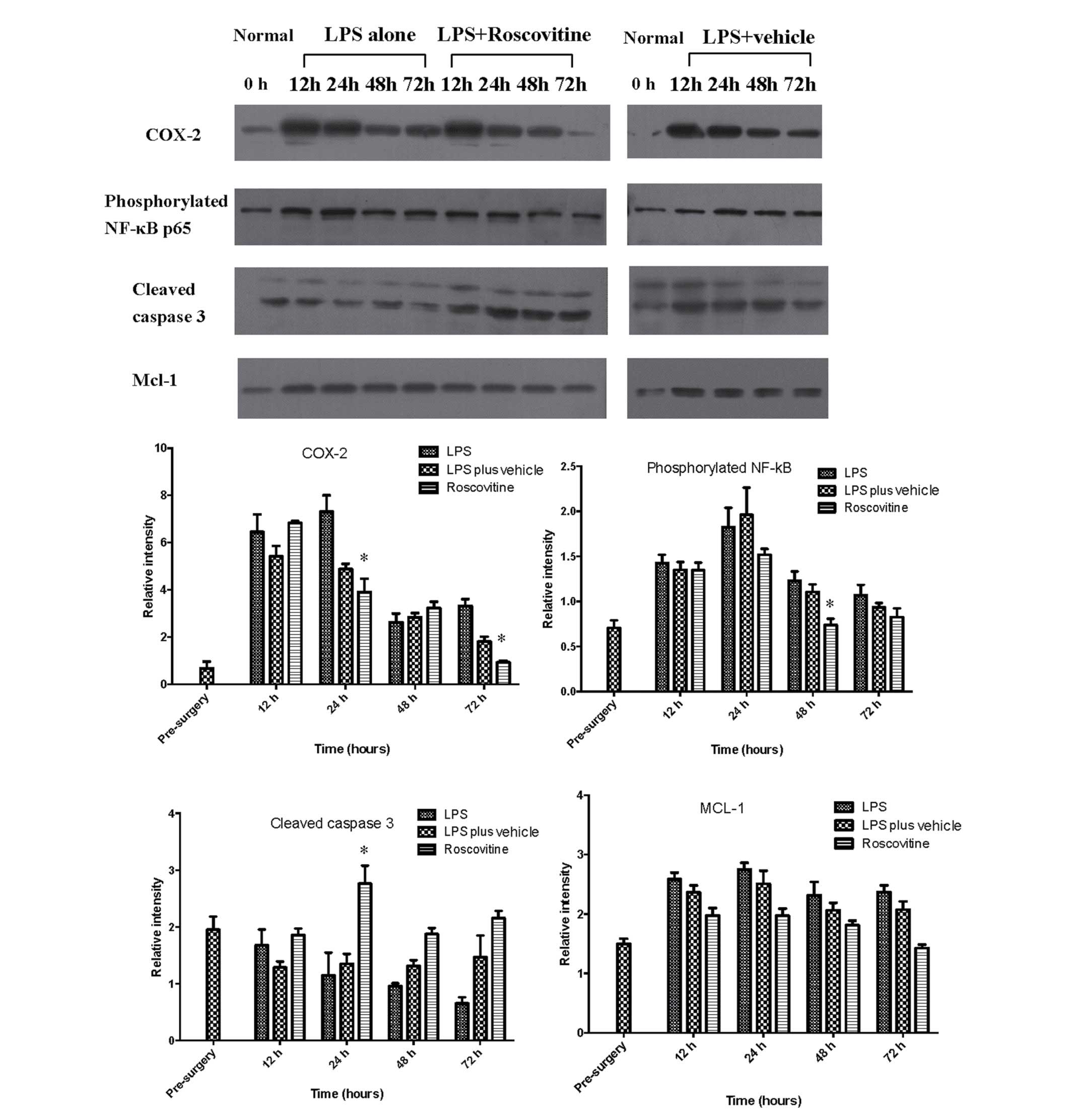|
1
|
Rathinam SR: Treating uveitis in the
developing world setting. Int Ophthalmol Clin. 50:219–228. 2010.
View Article : Google Scholar : PubMed/NCBI
|
|
2
|
Tomkins-Netzer O, Talat L, Bar A, Lula A,
Taylor SR, Joshi L and Lightman S: Long-term clinical outcome and
causes of vision loss in patients with uveitis. Ophthalmology.
121:2387–2392. 2014. View Article : Google Scholar : PubMed/NCBI
|
|
3
|
Rosenbaum JT, McDevitt HO, Guss RB and
Egbert PR: Endotoxin-induced uveitis in rats as a model for human
disease. Nature. 286:611–613. 1980. View
Article : Google Scholar : PubMed/NCBI
|
|
4
|
Mérida S, Palacios E, Navea A and
Bosch-Morell F: Macrophages and uveitis in experimental animal
models. Mediators Inflamm. 2015:6714172015. View Article : Google Scholar : PubMed/NCBI
|
|
5
|
Metrikin DC, Wilson CA, Berkowitz BA, Lam
MK, Wood GK and Peshock RM: Measurement of blood-retinal barrier
breakdown in endotoxin-induced endophthalmitis. Invest Ophthalmol
Vis Sci. 36:1361–1370. 1995.PubMed/NCBI
|
|
6
|
McMenamin PG and Crewe J:
Endotoxin-induced uveitis. Kinetics and phenotype of the
inflammatory cell infiltrate and the response of the resident
tissue macrophages and dendritic cells in the iris and ciliary
body. Invest Ophthalmol Vis Sci. 36:1949–1959. 1995.PubMed/NCBI
|
|
7
|
Mashimo H, Ohguro N, Nomura S, Hashida N,
Nakai K and Tano Y: Neutrophil chemotaxis and local expression of
interleukin-10 in the tolerance of endotoxin-induced uveitis.
Invest Ophthalmol Vis Sci. 49:5450–5457. 2008. View Article : Google Scholar : PubMed/NCBI
|
|
8
|
Bennouna S, Bliss SK, Curiel TJ and
Denkers EY: Cross-talk in the innate immune system: Neutrophils
instruct recruitment and activation of dendritic cells during
microbial infection. J Immunol. 171:6052–6058. 2003. View Article : Google Scholar : PubMed/NCBI
|
|
9
|
Nathan C and Ding A: Nonresolving
inflammation. Cell. 140:871–882. 2010. View Article : Google Scholar : PubMed/NCBI
|
|
10
|
Savill J, Dransfield I, Gregory C and
Haslett C: A blast from the past: Clearance of apoptotic cells
regulates immune responses. Nat Rev Immunol. 2:965–975. 2002.
View Article : Google Scholar : PubMed/NCBI
|
|
11
|
Gilroy DW, Lawrence T, Perretti M and
Rossi AG: Inflammatory resolution: New opportunities for drug
discovery. Nat Rev Drug Discov. 3:401–416. 2004. View Article : Google Scholar : PubMed/NCBI
|
|
12
|
El Kebir D and Filep JG: Role of
neutrophil apoptosis in the resolution of inflammation. Scientific
World Journal. 10:1731–1748. 2010. View Article : Google Scholar : PubMed/NCBI
|
|
13
|
MacCallum DE, Melville J, Frame S, Watt K,
Anderson S, Gianella-Borradori A, Lane DP and Green SR: Seliciclib
(CYC202, R-Roscovitine) induces cell death in multiple myeloma
cells by inhibition of RNA polymerase II-dependent transcription
and down-regulation of Mcl-1. Cancer Res. 65:5399–5407. 2005.
View Article : Google Scholar : PubMed/NCBI
|
|
14
|
Bach S, Knockaert M, Reinhardt J, Lozach
O, Schmitt S, Baratte B, Koken M, Coburn SP, Tang L, Jiang T, et
al: Roscovitine targets, protein kinases and pyridoxal kinase. J
Biol Chem. 280:31208–31219. 2005. View Article : Google Scholar : PubMed/NCBI
|
|
15
|
Cicenas J, Kalyan K, Sorokinas A,
Stankunas E, Levy J1, Meskinyte I, Stankevicius V, Kaupinis A and
Valius M: Roscovitine in cancer and other diseases. Ann Transl Med.
3:1352015.PubMed/NCBI
|
|
16
|
Rossi AG, Sawatzky DA, Walker A, Ward C,
Sheldrake TA, Riley NA, Caldicott A, Martinez-Losa M, Walker TR,
Duffin R, et al: Cyclin-dependent kinase inhibitors enhance the
resolution of inflammation by promoting inflammatory cell
apoptosis. Nat Med. 12:1056–1064. 2006. View Article : Google Scholar : PubMed/NCBI
|
|
17
|
Koedel U, Frankenberg T, Kirschnek S,
Obermaier B, Häcker H, Paul R and Häcker G: Apoptosis is essential
for neutrophil functional shutdown and determines tissue damage in
experimental pneumococcal meningitis. PLoS Pathog. 5:e10004612009.
View Article : Google Scholar : PubMed/NCBI
|
|
18
|
Yadav UC and Ramana KV: Endotoxin-induced
uveitis in rodents. Methods Mol Biol. 1031:155–162. 2013.
View Article : Google Scholar : PubMed/NCBI
|
|
19
|
McClue SJ, Blake D, Clarke R, Cowan A,
Cummings L, Fischer PM, MacKenzie M, Melville J, Stewart K, Wang S,
et al: In vitro and in vivo antitumor properties of the cyclin
dependent kinase inhibitor CYC202 (R-roscovitine). Int J Cancer.
102:463–468. 2002. View Article : Google Scholar : PubMed/NCBI
|
|
20
|
Huber RJ: The cyclin-dependent kinase
family in the social amoebozoan Dictyostelium discoideum. Cell Mol
Life Sci. 71:629–639. 2014. View Article : Google Scholar
|
|
21
|
Tirado OM, Mateo-Lozano S and Notario V:
Roscovitine is an effective inducer of apoptosis of Ewing's sarcoma
family tumor cells in vitro and in vivo. Cancer Res. 65:9320–9327.
2005. View Article : Google Scholar : PubMed/NCBI
|
|
22
|
Livak KJ and Schmittgen TD: Analysis of
relative gene expression data using real-time quantitative PCR and
the 2(-Delta Delta C(T)) method. Methods. 25:402–408. 2001.
View Article : Google Scholar
|
|
23
|
Meijer L and Raymond E: Roscovitine and
other purines as kinase inhibitors. From starfish oocytes to
clinical trials. Acc Chem Res. 36:417–425. 2003. View Article : Google Scholar : PubMed/NCBI
|
|
24
|
Sabroe I, Jones EC, Usher LR, Whyte MK and
Dower SK: Toll-like receptor (TLR) 2 and TLR4 in human peripheral
blood granulocytes: A critical role for monocytes in leukocyte
lipopolysaccharide responses. J Immunol. 168:4701–4710. 2002.
View Article : Google Scholar : PubMed/NCBI
|
|
25
|
Leitch AE, Haslett C and Rossi AG:
Cyclin-dependent kinase inhibitor drugs as potential novel
anti-inflammatory and pro-resolution agents. Br J Pharmacol.
158:1004–1016. 2009. View Article : Google Scholar : PubMed/NCBI
|
|
26
|
Knockaert M, Greengard P and Meijer L:
Pharmacological inhibitors of cyclin-dependent kinases. Trends
Pharmacol Sci. 23:417–425. 2002. View Article : Google Scholar : PubMed/NCBI
|
|
27
|
Ariel A, Fredman G, Sun YP, Kantarci A,
Van Dyke TE, Luster AD and Serhan CN: Apoptotic neutrophils and T
cells sequester chemokines during immune response resolution
through modulation of CCR5 expression. Nat Immunol. 7:1209–1216.
2006. View
Article : Google Scholar : PubMed/NCBI
|
|
28
|
Sica A and Mantovani A: Macrophage
plasticity and polarization: In vivo veritas. J Clin Invest.
122:787–795. 2012. View
Article : Google Scholar : PubMed/NCBI
|
|
29
|
Smith JR, Hart PH and Williams KA: Basic
pathogenic mechanisms operating in experimental models of acute
anterior uveitis. Immunol Cell Biol. 76:497–512. 1998. View Article : Google Scholar
|
|
30
|
Planck SR, Becker MD, Crespo S, Choi D,
Galster K, Garman KL, Nobiling R and Rosenbaum JT: Characterizing
extravascular neutrophil migration in vivo in the iris.
Inflammation. 31:105–111. 2008. View Article : Google Scholar : PubMed/NCBI
|
|
31
|
Guex-Crosier Y, Wittwer AJ and Roberge FG:
Intraocular production of a cytokine (CINC) responsible for
neutrophil infiltration in endotoxin induced uveitis. Br J
Ophthalmol. 80:649–653. 1996. View Article : Google Scholar : PubMed/NCBI
|
|
32
|
Carlos TM and Harlan JM:
Leukocyte-endothelial adhesion molecules. Blood. 84:2068–2101.
1994.PubMed/NCBI
|
|
33
|
Hoogendijk AJ, Roelofs JJ, Duitman J, van
Lieshout MH, Blok DC, van der Poll T and Wieland CW: R-roscovitine
reduces lung inflammation induced by lipoteichoic acid and
Streptococcus pneumoniae. Mol Med. 18:1086–1095. 2012. View Article : Google Scholar : PubMed/NCBI
|



















